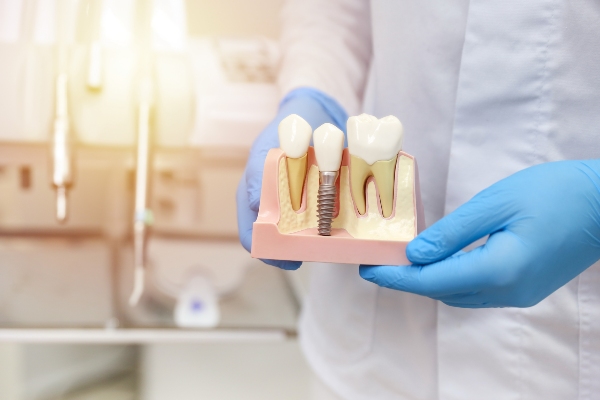 Dental implants provide a reliable and long-lasting solution for those with missing teeth. They offer numerous benefits, including improved speech, appearance, and chewing function. However, like any medical procedure, dental implants have potential risks and complications you should be aware of before proceeding with treatment.
Dental implants provide a reliable and long-lasting solution for those with missing teeth. They offer numerous benefits, including improved speech, appearance, and chewing function. However, like any medical procedure, dental implants have potential risks and complications you should be aware of before proceeding with treatment.
Infection
Infection is a risk associated with any surgical procedure, including dental implant placement. Bacteria can enter the surgical site during the procedure or in the following days. An infection around the implant can lead to discomfort, swelling, and even implant failure if left untreated. The risk of infection is lowered when the patient chooses a skilled and experienced oral surgeon who follows strict sterilization protocols and provides thorough post-operative care instructions. We will take all necessary precautions to ensure the patient's safety during the procedure.
Nerve damage
Nerve damage is a rare but serious complication of dental implant surgery. This procedure can potentially damage the mandibular nerve, which supplies sensation to the lower lip, chin, and teeth. While this damage can be mild, there are rare cases in which patients experience permanent numbness or altered sensation in these areas.
Dental issues
In some cases, dental implant placement affects the teeth around the implant. If nearby teeth have minor issues such as decay or root damage, the trauma of implant surgery can worsen these issues later. Many dentists and oral surgeons recommend examining and treating existing dental issues before implant placement to prevent future dental issues.
Implant failure
While dental implants typically have a high success rate, there is a small chance of implant failure. This can occur due to various factors, including:
- Poor bone quality
- Inadequate osseointegration
- A compromised healing process
Our team can assess the patient's jawbone and oral health before the surgery, significantly reducing the risk of implant failure.
Allergic reactions
Though rare, some people may experience allergic reactions to the materials used in dental implants. Most implants consist of biocompatible materials like titanium, which the human body typically tolerates well. Nevertheless, discussing any known allergies or sensitivities with our team before the procedure is important to ensure the chosen materials do not cause any adverse reactions.
Sinus issues (Upper jaw implants)
When placing implants in the upper jaw, particularly in the back portion, there is a risk of perforating the sinus membrane. This can lead to sinus congestion, pain, and the possibility of a sinus infection. Skilled oral surgeons employ advanced imaging techniques like CBCT scans to carefully plan implant placement and minimize the risk of risk complications.
Gum recession
Improperly placed implants or poor oral hygiene habits can lead to gum recession around the implant site. This gum recession can expose the implant's metal framework, creating an aesthetic concern and potentially compromising the implant's stability. Regular check-ups with an oral surgeon and maintaining good oral hygiene habits can help prevent this issue.
Have concerns about implant surgery?
Like any surgical procedure, dental implant placement comes with potential risks and complications. However, with proper care and attention, dental implants can give you a long-lasting and natural-looking smile. Call our office to discuss any concerns or schedule a consultation.
Request an appointment or call Premier Oral Surgery & Implantology Center at 203-347-4046 for an appointment in our Cos Cob office.
Related Posts
Preparation is a crucial part of the success of procedures involving dental implants. When it comes to tooth replacement, implants offer a solution similar to having a natural tooth again. However, patients should understand the process and the steps they must take to lay the foundation for a safe and effective procedure.The entire dental implant…
Dental implants support permanent artificial teeth, making them a popular alternative to dentures. Dental implants require oral surgery, providing a durable, effective, and natural-looking tooth replacement. If you are considering implants, preparing for the postoperative period can make for a much smoother recovery.Dental implants are biocompatible metal or ceramic posts inserted into the jaw. They…
Dental implants can make you feel more confident about your smile, and they keep bone tissues in your jaw healthy. Implants are one of the popular ways to replace missing teeth and provide more benefits than alternatives like dentures and implants.Implants serve as bases for artificial teeth that are attached to them, like crowns, dentures,…
